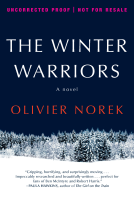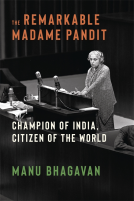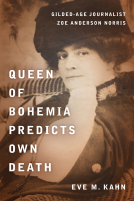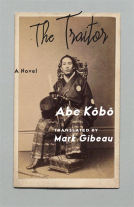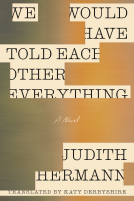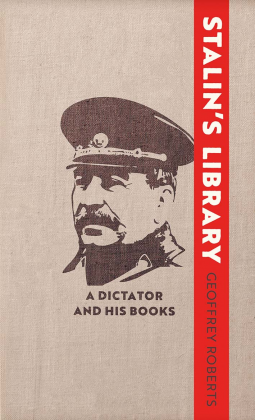
Stalin's Library
A Dictator and his Books
by Geoffrey Roberts
This title was previously available on NetGalley and is now archived.
Send NetGalley books directly to your Kindle or Kindle app
1
To read on a Kindle or Kindle app, please add kindle@netgalley.com as an approved email address to receive files in your Amazon account. Click here for step-by-step instructions.
2
Also find your Kindle email address within your Amazon account, and enter it here.
Pub Date Feb 08 2022 | Archive Date Feb 25 2022
Yale University Press, London | Yale University Press
Talking about this book? Use #StalinsLibrary #NetGalley. More hashtag tips!
Description
“[A] fascinating new study.”—Michael O’Donnell, Wall Street Journal
In this engaging life of the twentieth century’s most self-consciously learned dictator, Geoffrey Roberts explores the books Stalin read, how he read them, and what they taught him. Stalin firmly believed in the transformative potential of words, and his voracious appetite for reading guided him throughout his years. A biography as well as an intellectual portrait, this book explores all aspects of Stalin’s tumultuous life and politics.
Stalin, an avid reader from an early age, amassed a surprisingly diverse personal collection of thousands of books, many of which he marked and annotated, revealing his intimate thoughts, feelings, and beliefs. Based on his wide-ranging research in Russian archives, Roberts tells the story of the creation, fragmentation, and resurrection of Stalin’s personal library. As a true believer in communist ideology, Stalin was a fanatical idealist who hated his enemies—the bourgeoisie, kulaks, capitalists, imperialists, reactionaries, counter-revolutionaries, traitors—but detested their ideas even more.
Advance Praise
"Stalin was a lifelong reader of astonishing stamina and range. In this shrewd and compelling exploration, Geoffrey Roberts finds the key to understanding the despot and his despotism hidden in plain sight in the pages of his books. The love of reading drew Stalin to the revolution and gave him the intellectual assurance that all his ruthless violence was both necessary and justified. Stalin's Library offers a new and fascinating depth of insight into the mind of a fanatic."—Rachel Polonsky, author of Molotov's Magic Lantern
“Innovative and intriguing: the warlord and mass-murderer as bookworm, librarian and intellectual. A fascinating read.”—David Reynolds, co-author of The Kremlin Letters: Stalin's Wartime Correspondence with Churchill and Roosevelt
“A German philosopher once said, "Tell me how you read and I'll tell you who you are." Geoffrey Roberts's study of the remains of Stalin's library, and the angry exclamations and demanding queries made by the tyrant's blue pencil in the margins (and sometimes whole rewritten pages) reveals Stalin as a fanatical proof-reader, a phenomenally gifted interrogator of other persons' opinions.”—Donald Rayfield, author of Stalin and His Hangmen
“This fascinating, original, and meticulously researched study of Stalin’s library offers penetrating insight into the mind of a dictator who valued ideas as much as power. In exploring Stalin as an avid reader of books, Roberts punctures many myths about the man.”—Stephen Smith, author of Russia in Revolution
Available Editions
| EDITION | Other Format |
| ISBN | 9780300179040 |
| PRICE | $30.00 (USD) |
| PAGES | 272 |
Average rating from 5 members
Featured Reviews
A voracious reader, Josef Stalin had his own library of some 25,000 books, for which he employed the services of a librarian. He developed his own classification system and ex-libris stamp, and was fond of annotating and marking the books he read. He was a great respecter of books, if not of the people who wrote them. Whilst Stalin despised his political opponents, he paid close attention to their writings.
A surprising portrait of the infamous Russian leader emerges from the scholarly pages of “Stalin’s Library” by Geoffrey Roberts - that of an intellectual and deep thinking bookworm and autodidact who revered books, even berating his own children when they treated them poorly. Roberts discovers a tantalising (though not a complete) insight into the real Stalin by analysing the way he read his books and the marks he made in them. It is also an attempt to provide a verifiable biography of Stalin, debunking many “conspiracy theories” and incorrect yet widely believed facts about him.
Stalin was, conversely, shy of allowing books to be written about himself, vetoing many biographies and pamphlets, and those that were published were vigorously marked up if he disagreed with them. However, Stalin was more enthusiastic about the creation of his collected writings, a popular publication running to thirteen volumes until they were halted by Khrushchev. There is a revealing chapter on these books, their legacy and the unpublished final volumes, and very interesting details of the specific genres of books that Stalin favourited and the historical attempts to study his library. The longest chapter in the book is devoted to an rich and illuminating study of Stalin’s “potemki”, the marks, annotations and sometimes angry crossings-out that he added to many of the books he read.
Geoffrey Roberts has written a very readable and intelligent book; ostensibly pro-Stalin only in regard to establishing a factual biographical life of the man, and thoroughly researched. While there is much about Stalin’s library itself and its legacy and how his reading influenced him as a political leader, the book is also a history of Stalin’s rise to power and beyond. While this does create something of an identity crisis at times, this book is excellent throughout and is highly recommend to anyone searching for a slightly different take on Stalin’s life and times.
I really enjoyed this book. The author had brought a tremendous amount of knowledge about Stalin to bear on his analysis of his books, and that, of course, made a huge difference. I found it to be very readable and as someone who would lack the language skills to work with most of the books myself I appreciated his glosses on their contents and significance.
All in all, a fine addition to the growing number of books about famous figures’ libraries.
 Mandy J, Reviewer
Mandy J, Reviewer
It’s hard to imagine Stalin curling up with a good book, but in fact he was a voracious reader and amassed a library of over 25,000 books, journals and pamphlets. This was dispersed upon his death but author Geoffrey Roberts has tracked down many of the actual books and what makes this significant is that Stalin marked and annotated his books thus giving us today an insight into his reactions and thoughts. He was an autodidact and an intellectual, an aspect of his character that we tend to overlook. Most of his reading matter was Marxist because above all he was an idealist and ideological fanatic, never doubting that he was correct in his thinking and much of his world-view is confirmed in the many comments and annotations he made in his books. He wasn’t alone in liking to read. Many of the early Bolsheviks were also great readers and also collected large libraries. This meticulously researched account of Stalin and his books is an unusual and original way of examining the dictator and is an insightful, intelligent and eminently readable exploration of the man who ruled the Soviet Union with an iron fist. A must-read for anyone interested in Stalin and Russian history.
Readers who liked this book also liked:
Rachel Joyce
Historical Fiction, Literary Fiction, Women's Fiction
We Are Bookish
Biographies & Memoirs, Health, Mind & Body, Nonfiction (Adult)
